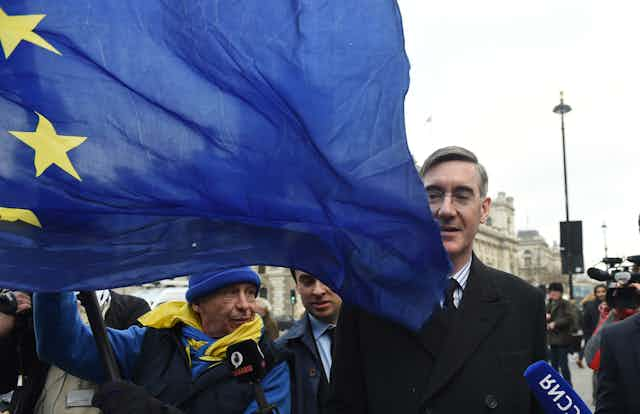After decades of in-fighting, the Conservative Party has united in parliament over a Brexit strategy. But why is this so surprising? What is behind this sudden show of unity? And can we expect more of it in the future?
Like Labour, the Conservative Party is a “broad church”. It unites several political traditions and ideologies for pragmatic parliamentary purposes. The reason for this is historical.
Electoral and parliamentary power in the UK are games of numbers – and since the 18th century the Tory party has been restocking its ranks by allowing (or encouraging) its opponents to split into factions and then recruiting whatever pragmatic actors and thinkers have been left marooned by radicalism. In this way, British Toryism has been enriched by Whig critics of the French Revolution, Whig opponents of the protectionist Corn Laws, Liberal opponents of Irish home rule and imperial disengagement, and classical liberal denouncers of socialism.
The effect of this process is that today’s Conservative Party accommodates traditionalists and modernisers, nationalists and cosmopolitans, monetarists and Keynesians, “one nation” Tories and opponents of egalitarian “social engineering”. As a party, the Conservatives can enjoy political allegiance and electoral solidarity so long as the political agenda is dominated by the sorts of political problems upon which they generally share opposition to other parties.
But when the agenda is topped by an issue which opens up these differences, the party’s internal diversity becomes open division. The European project has always been exactly such an issue. Divisions on the subject plagued Margaret Thatcher following her 1988 Bruges speech, John Major during the Maastricht rebellion, and David Cameron during the rise of UKIP and the 2016 referendum. The latter has been brilliantly documented in the first episode of Inside Europe: Ten Years of Turmoil_.
It is perhaps surprising that no Conservative prime minister has succeeded in imposing, upon the party of British unionism and nation-state sovereignty, a uniform attitude to European involvement in British domestic policy. But again the reason is historical.
The Conservative Party is the party of tradition and sceptical opposition to rapid change. It commonly formulates its principles in response to “progressive” causes. And yet it was the Conservative Party that initiated Britain’s entry to the European Economic Community, led by Edward Heath, a modernising, progressive, “one-nation” Tory. Had this process been led by a pro-European Labour party, it would have seemed natural for the Conservatives to coalesce around the countervailing eurosceptical position. But this is not what happened.
Labour was also divided on Europe – and remains so. But Labour’s divisions are practically invisible because, since the 1975 referendum, whenever Europe has been high on the political agenda Labour has had the good fortune of being in opposition.
Temporary truce
Is the Conservatives’ show of unity around Theresa May a sign of a gradual reconciliation of its diverse views of Europe? In short, no. This week’s reunification was an effect of the specificity of the parliamentary situation. The amendments that Conservative MPs, both Leavers and Remainers, united to oppose in parliament are those which would have reduced the power of their own prime minister. Conversely, the amendment they united behind is that which supported the PM’s pursuit of something better than a no-deal Brexit.
The good news for the Conservatives is that this show of unity will probably play well with the electorate, which typically rewards unity and punishes factionalism. Leavers approve of assertiveness towards Brussels, and do not abhor “no deal” as much as “no Brexit”. Many Remainers see the PM working to avoid no deal and have other plans for avoiding it if Brussels won’t budge on the withdrawal agreement. Another referendum is among those plans.

But the bad news is that this party unity is only an unseasonal warm spell. It seems very unlikely that Brussels will agree to any changes to the withdrawal agreement. And, even if it does, the Conservatives will soon divide over other forthcoming parliamentary votes, including any move to extend Article 50, not to mention the future relationship negotiations – if we ever get that far. And of course, like the whole country, they would disagree on any question relating to a second referendum.
In the long term, the unity of the Conservative Party depends on issues such as Brexit being rare, fleeting, or relatively unimportant to the electorate. After the past three years, it is hard to imagine a future in which nobody is talking about the EU and attention returns to bread-and-butter domestic policy. But neither of the two main parties has any interest in Europe becoming the central issue of a general election or, worse, a permanent feature at the top of the agenda.
The Conservatives know that, whatever polling suggests, a general election before Brexit Day would risk electoral annihilation. The manifesto alone would provoke open rebellion. And if the European question does not go away – in the long afterlife of “no Brexit”, for example – the party’s future depends on its achieving something that none of its leaders has ever managed: establishing a single, distinct, and nationally popular Conservative policy on Britain’s future relationship with the EU.

